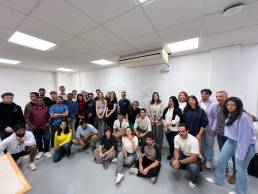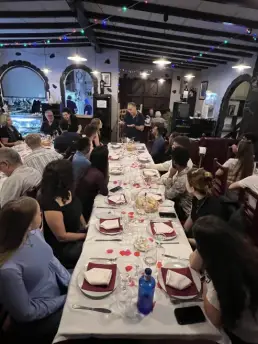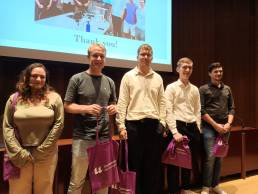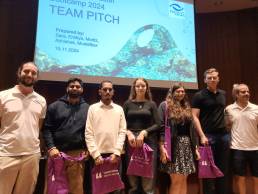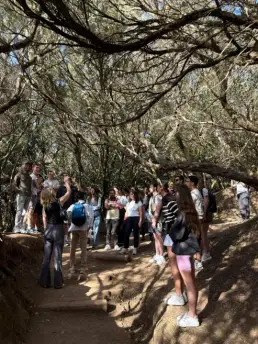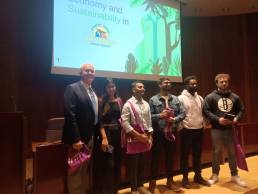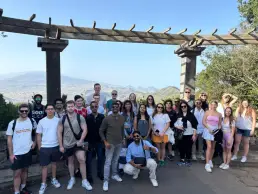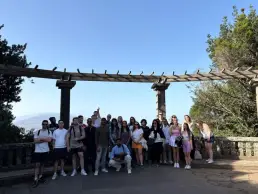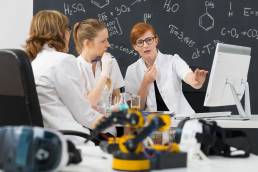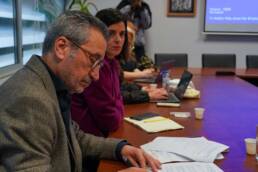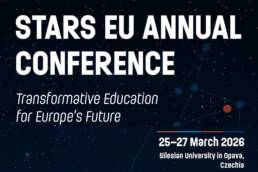This intensive training experience has been completed with a programme of face-to-face classes and workshops held in Tenerife
A dozen students from STARS EU have just finished the classes of a BIP Erasmus+ course on circular economy, the face-to-face part of which has been taught at the Faculty of Economics, Business and Tourism of the University of La Laguna, a member of the alliance. This brings to an end four consecutive weeks of online training in which 25 students from five universities have participated, and innovative teaching techniques have been used that promote collaboration between students from different countries.
These face-to-face sessions, which have been taking place from 9 to 16 November at the ULL, have allowed STARS students to present their ideas in a series of common proposals, as well as to carry out fieldwork and interviews with the teaching staff of several of the nine partner universities. The teaching programme has been completed with a series of visits to local companies and institutions, where participants have been able to see in situ real examples of the concepts learned in the programme.
Circular Innovation Bootcamp 2024 ─developed under the Blended Intensive Programme (BIP) modality of the Erasmus+ call─ has brought together students and faculty from three STARS EU universities: the Aleksandër Moisiu Durrës University (UAMD, Albania), the Polytechnic Institute of Bragança (IPB, Portugal) and the University of La Laguna, which have been joined by Kempten University of Applied Sciences (HKE, Germany) ─organizer of the initiative─, and Kaunas University of Technology (KTU, Lithuania).
After concluding the teaching programme, with the presentations given by the students in the face-to-face classes, the next step of this BIP is to develop a project, in written and audiovisual format, in which the fundamentals of sustainability, circularity, business models and innovation, acquired throughout the blended training period that has been developed for a month, are reflected and applied.
According to Rodrigo Trujillo González, member of the Steering Committee of STARS EU ALLIANCE, researcher in the area of Mathematical Analysis and coordinator of this BIP at the University of La Laguna, the objective of this type of hybrid and transnational training “goes beyond providing knowledge, since it allows students to have academic experiences close to real life and contact with a productive fabric very different from the continental one, which makes this bootcamp a compressed living lab from which to enhance their abilities to face complex problems in the future.”
Advantages of the ‘bootcamp’
Among the advantages offered by this Circular Innovation Bootcamp ─ which is equivalent to five credits from the members of the alliance ─ are to provide students with an intensive study methodology, in a short period of time, while allowing them to acquire practical and specific knowledge related to the circular economy, innovation and sustainability.
The face-to-face programme given in Tenerife has been structured around various business models ranging from the most advanced R+D to the tourism sector, water treatment (purification and desalination) and the blue economy.
The attending students have been trained in the analysis of the development of circular economy models in these productive niches and proposals for innovative solutions for companies in this field. The specific knowledge on these models in the tourism sector was imparted by Eduardo Parra López, an expert in tourism management and professor of Business Organization, Digital Economy and Tourism at the University of La Laguna.
The online training, which began on 7 October, was led by professors Sofía Cardim (IPB), Katrin Stefan (HKE), Andreas Müller (HKE), Alba Ramallari (UAMD), Lina Uziene (KTU), Llambi Prendi (UAMD), Paula Odete Fernandes (IPB), Filomena Barreiro (IPB), as well as Manuel Talamante and Rodrigo Trujillo, from the ULL. The face-to-face classes taught at the ULL were completed with coaching sessions focused on the design of innovative proposals around the framework of the circular economy.
In addition to the face-to-face classes, workshops and scheduled visits, the participating students were able to get to know some of the most emblematic corners of Tenerife, such as the Teide National Park, Garachico and the Anaga Massif, activities necessary to understand the geography of the island and acquire knowledge with which to prepare their queries to the member companies: IACTEC, TAGUA, Pisces VI, Wooptix and Loro Parque Foundation.
Sustainable business models
The 2024 edition of this BIP builds on a series of previous experiences developed at the University of Kempten, which has perfected field studies on sustainable business models on the island of Tenerife since 2017, which included visits to the ULL, Institute of Technology and Renewable Energies (ITER), as well as meetings with members of PROEXCA, the support programme for the internationalisation of Canary Islands companies, among other organisations.
In fact, this activity originated thanks to the professional contacts that Dr. Hon Guenter Köch ─member of the International Advisory Board of the STARS EU ALLIANCE─, maintained with the Kempten University, which was the one that contacted the ULL to start this training and mobility collaboration that, over the years, has been consolidated in this BIP.
The organisation and coordination of the visits to the companies has been carried out under the supervision of Monika González-Koss and Köch, both at the head of the Humboldt Cosmos Multiversity, a non-profit foundation that promotes the circulation of knowledge and the development of university talent.
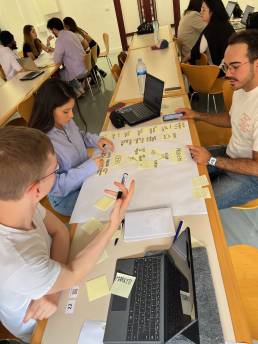
Related Posts
February 6, 2026
Celebrate the International Day of Women and Girls in Science with STARS EU
The alliance demonstrates its commitment to full and inclusive participation of…
February 3, 2026
Bragança Polytechnic University and University West strengthen their strategic cooperation in research and doctoral training within STARS EU
The meeting addressed the implementation of joint doctorates and the connection…
January 30, 2026
Education to address new challenges, focus of the third STARS EU Annual Conference
The next event will take place in March 2026 at the Silesian University in…

